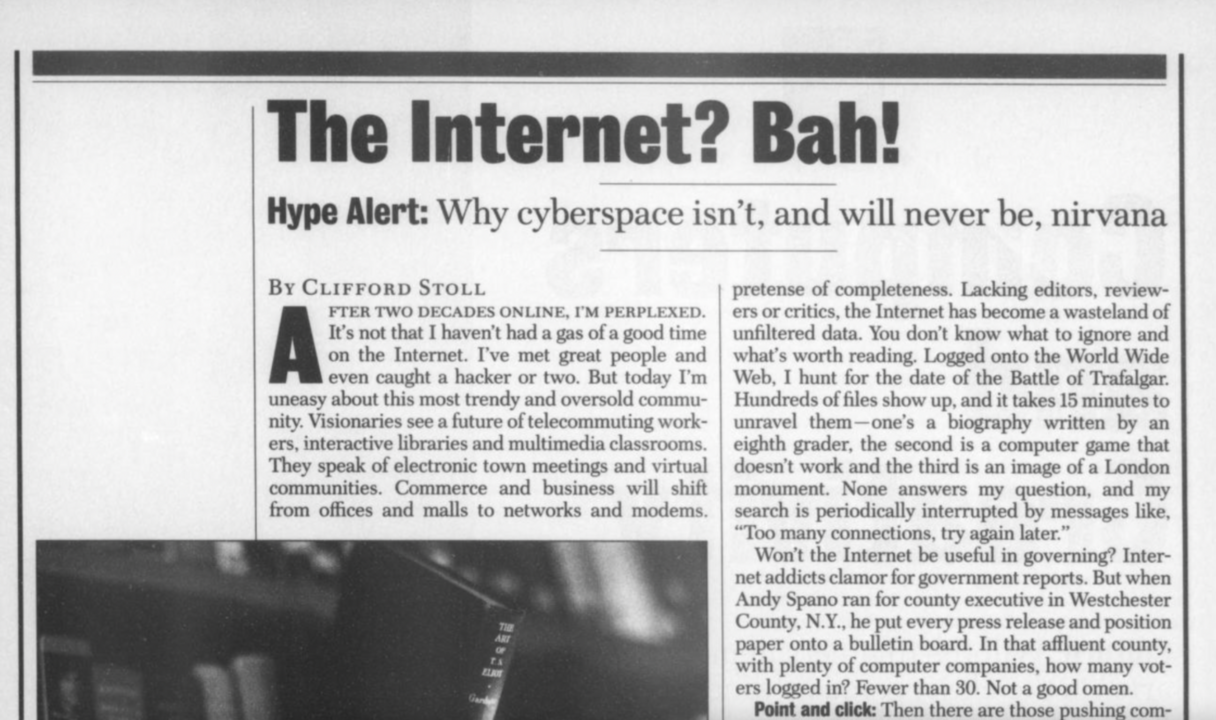Spare a thought for Clifford Stoll, the American astronomer who wrote a column in 1995 titled, ‘The Internet? Bah!’. A derisive opinion piece about the role of computers and the internet:
“Visionaries see a future of telecommuting workers, interactive libraries and multimedia classrooms. They speak of electronic town meetings and virtual communities. Commerce and business will shift from offices and malls to networks and modems. And the freedom of digital networks will make government more democratic.
Baloney. Do our computer pundits lack all common sense? The truth in no online database will replace your daily newspaper, no CD-ROM can take the place of a competent teacher and no computer network will change the way government works.”
Newsweek has, I’m sure to Stoll’s delight, published the full article here. Although, his true step into the limelight was through discovering KGB hacker Markus Hess in 1986. Stoll has also become something of a YouTube sensation with his lectures. Ironic that a man publicly sceptical of the internet has ended up having a career defined by it.
It’s worth keeping in mind that Stoll’s internet was before Google and the algorithmic order we take for granted today. Read a bit deeper into Stoll’s thoughts on why the “web won’t be nirvana” and it’s difficult to argue back:
“What’s missing from this electronic wonderland? Human contact… Computers and networks isolate us from one another. A network chat line is a limp substitute for meeting friends over coffee. No interactive multimedia display comes close to the excitement of a live concert. And who’d prefer cybersex to the real thing?”
It’s a sentiment that was well reflected in Sherry Turkle’s book Alone Together. We (the public) are finding social technologies that simulate life more alluring than life itself. Only the other day was I targeted by a Facebook advert promoting an artificial friend… or romantic partner for a small monthly fee. Mimic a friend on messenger, in the absence of the real thing – how many of us are living in this pretend world, together, alone?
Now enter from stage left, the metaverse. Today, the development of Web3 technologies is resurfacing some of Stoll’s original criticisms of the internet.
Nick Clegg, president for global affairs at Meta, recently spoke on the World Economic Forum’s podcast about the metaverse. He explains the metaverse as the next logical evolution of the internet. We’ve already seen form factors change over time, from computers that filled entire rooms, to ones that can fit on our wrist. Content has moved from simple text messages to immersive videos. We are all heading towards technology allowing a move to a greater life-embodiment.
Professionally, I’ve been involved in the development of a metaverse and have seen first-hand the investment and planning. If Web 1.0 represented an internet of static published content, Web 2.0 introduced mainstream social communities and interaction, then logically Web 3.0 must be about the mixed world reality of digital and physical.
Stoll was right in 1995 – it’s hard to argue that online social interaction is perfect. Nobody through the rose-tinted glasses of Web 2.0 could have foreseen the true impact of disinformation on election campaigns, the prominence of illicit marketplaces, and sadly the role of the Dark Web in child abuse. Our opinions are based on the past and present – not so much the future.
Avid readers of The Drum may have read, ‘The metaverse doesn’t exist! You’re taking about gaming’. To which the premise of the arguments can be surmised as:
1) The metaverse does not exist
2) Therefore, people don’t know what they’re talking about
3) Even if a metaverse did exist, it’s not suitable for purpose
I encourage you to read the article; using Jyri Engeström ‘social object theory’ is an important consideration for the companies who are investing in the metaverse, whatever they will end up looking like. I do agree that often gaming is pointed to as metaverse examples, which is incorrect. But,
1) Just because it doesn’t exist, doesn’t mean it never will
2) To say people don’t know what they’re talking about, given a technology doesn’t exist, could be said about any of humankinds’ achievements – like the moon landing
3) If a metaverse did exist, then it should rightfully be designed for purpose
Nick Clegg provided metaverse use cases like teachers on virtual fieldtrips, obviating the need for mass commuting, surgeons educating medical students – the applications are endless. It’s not just Meta investing in the metaverse. Keep a close eye on Microsoft, Google, Nvidia, and Qualcomm. Each publishing their own thought leadership and vision for the future internet.
Whilst the metaverse vision doesn’t exist yet, don’t dismiss it. Don’t be the Stoll of 1995 who dismissed the role of computers and the internet. In just a few years, I’m convinced the metaverse vision will live.



